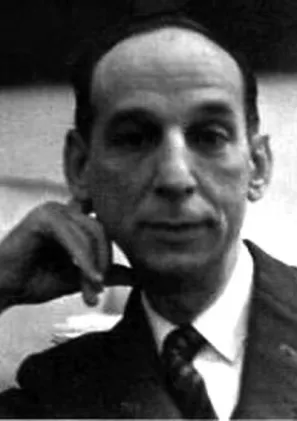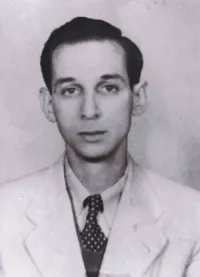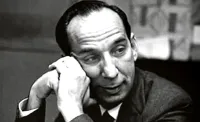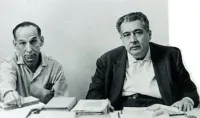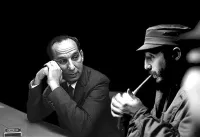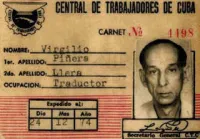Biography
1912 - 1979
Born in Cárdenas, Cuba on August 4, 1912, as a boy Virgilio Piñera’s primary pastime was reading. By his early teens he began to write. His first published poem was El Grito Mudo (The Mute Scream) in 1936. He wrote his first play Clamor en el Penal (Noise in the Penitentiary) the following year. Piñera continued writing poems, essays, short stories, and primarily plays. Piñera founded the magazine Poeta and along with José Lezama Lima and José Rodriguez Feo he co-founded Orígenes. His modernist tragicomedy Electra Garrigó (1948) blasted the values of Cuba’s upper class and mocked high brow culture. Many were offended and walked out of the performance. The play is often cited as the birth of Cuban Modernism. By then the bohemian and overtly gay Piñera was spending larger amounts of time in Buenos Aires. There he came to know Jorge Luis Borges and other revolutionary writers who further influenced his work. Piñera returned to Cuba in 1958, in time to see Batista flee and Castro’s revolution triumphant. Piñera began working on the newspaper Revolución under the pseudonym The Writer. At this time his play, Aire Frío (Cold Air), opened to wide acclaim. However, the Castro regime began censuring artists whose work was not clear, realistic, and easily accessible. Piñera’s often irreverent and frequently experimental work was neither. His gay identity only added to his troubles with the new government. He was arrested for “political and moral crimes” during the government’s campaign against the “three Ps” -- prostitutes, pimps and “pájaros,” Cuban slang for gay people. He was released soon after. In the years that followed his work was largely ignored. Stagings of his plays became rare. An exception for Piñera was being honored with the prestigious Casa de las Américas award for his play Dos Viejos Pánicos (Two Elderly People in a Panic) in 1968. He died of a heart attack in Havana on October 18, 1979, largely forgotten and officially ignored. Today his work is seen as a model by many Cuban and Latin American authors. A Piñera renaissance continues, most notably in 2012, the centennial of his birth year, which was declared “El Ano Virgiliano” in Cuba and saw new stagings of both Aire Frio and Dos Viejos Panicos in Havana.
1912 - 1979
Born in Cárdenas, Cuba on August 4, 1912, as a boy Virgilio Piñera’s primary pastime was reading. By his early teens he began to write. His first published poem was El Grito Mudo (The Mute Scream) in 1936. He wrote his first play Clamor en el Penal (Noise in the Penitentiary) the following year. Piñera continued writing poems, essays, short stories, and primarily plays. Piñera founded the magazine Poeta and along with José Lezama Lima and José Rodriguez Feo he co-founded Orígenes. His modernist tragicomedy Electra Garrigó (1948) blasted the values of Cuba’s upper class and mocked high brow culture. Many were offended and walked out of the performance. The play is often cited as the birth of Cuban Modernism. By then the bohemian and overtly gay Piñera was spending larger amounts of time in Buenos Aires. There he came to know Jorge Luis Borges and other revolutionary writers who further influenced his work. Piñera returned to Cuba in 1958, in time to see Batista flee and Castro’s revolution triumphant. Piñera began working on the newspaper Revolución under the pseudonym The Writer. At this time his play, Aire Frío (Cold Air), opened to wide acclaim. However, the Castro regime began censuring artists whose work was not clear, realistic, and easily accessible. Piñera’s often irreverent and frequently experimental work was neither. His gay identity only added to his troubles with the new government. He was arrested for “political and moral crimes” during the government’s campaign against the “three Ps” -- prostitutes, pimps and “pájaros,” Cuban slang for gay people. He was released soon after. In the years that followed his work was largely ignored. Stagings of his plays became rare. An exception for Piñera was being honored with the prestigious Casa de las Américas award for his play Dos Viejos Pánicos (Two Elderly People in a Panic) in 1968. He died of a heart attack in Havana on October 18, 1979, largely forgotten and officially ignored. Today his work is seen as a model by many Cuban and Latin American authors. A Piñera renaissance continues, most notably in 2012, the centennial of his birth year, which was declared “El Ano Virgiliano” in Cuba and saw new stagings of both Aire Frio and Dos Viejos Panicos in Havana.
Demography
Demography
Gender Male
Sexual Orientation Gay
Gender Identity Cisgender
Ethnicity Latinx
Nations Affiliated Cuba Argentina
Era/Epoch Cold War (1945-1991) Cuban Revolution (1953-1958) Information Age (1970-present)
Field(s) of Contribution
Author
Business
Editor
Journalism
Poet
Theater
World History
Commemorations & Honors
Casa de las Américas Award For His Play Dos Viejos Pánicos
Demography
Gender Male
Sexual Orientation Gay
Gender Identity Cisgender
Ethnicity Latinx
Nations Affiliated Cuba Argentina
Era/Epoch Cold War (1945-1991) Cuban Revolution (1953-1958) Information Age (1970-present)
Field(s) of Contribution
Author
Business
Editor
Journalism
Poet
Theater
World History
Commemorations & Honors
Casa de las Américas Award For His Play Dos Viejos Pánicos
Resources
Resources
Resources
